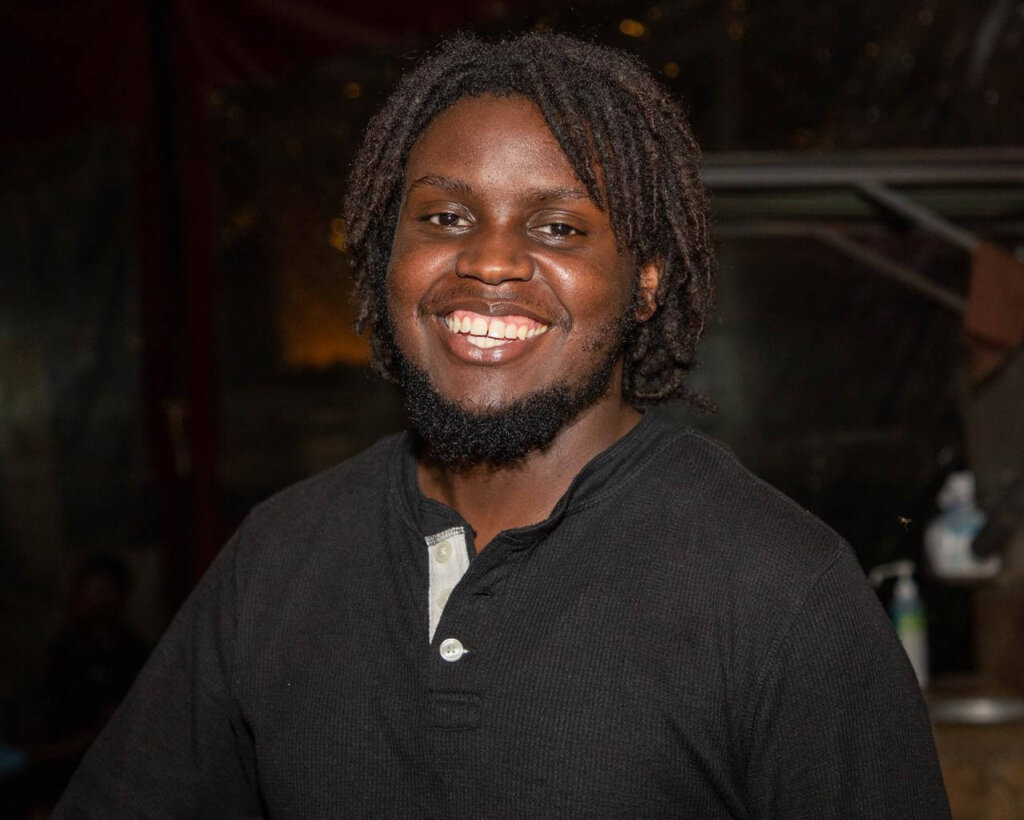In late October this year, The Nest Collective and distributors Big World Cinema made the film Stories of Our Lives accessible online. Finally, Kenyan film fans like myself had a chance to watch this film that has been banned in Kenya for ten years, so you can imagine my disappointment when I discovered the viewing link was only available to those outside the country. About a month later, Big World Cinema and Wanuri Kahiu announced that Rafiki, another acclaimed film, was available to watch online – again, with the same caveat: not available in Kenya.
What unites these two films, aside from being banned by the Kenya Film Classification Board (KFCB), is that they are stories about sexuality, specifically about queerness — a subject still shrouded in stigma and regulation in this country.
As a film journalist and critic, it’s deeply frustrating to witness the most daring and timely Kenyan films locked out of their home audience. These films deserve to be seen, discussed, debated, and celebrated on their merits, not buried under the weight of censorship. Yet here we are, barred from engaging with them like any other piece of cinema. Instead, we’re left to dissect the machinery of their suppression—a grim but necessary task.
That machinery, the Kenya Film Classification Board (KFCB) was established in 1981, then called The Department of Film Services. Christened in the colonial-era Film and Stage Plays Act of 1962, the KFCB operates with unquestioned authority. It’s basically the government. It’s constitutional, and it has real power. It’s Kenya’s equivalent of the MPA (Motion Picture Association) , tasked with rating films based on content such as violence, sexuality, and religious themes. Audiences sometimes overlook these ratings because they’re not really enforceable on a large-scale. For instance, you could take your nine-year-old brother to a PG-13 movie and nobody would bat an eye. It’s only when a film is banned that we truly feel the effects of the KFCB’s oversight, although their judgement can sometimes veer into outright prohibition, wielding censorship as a blunt instrument.
The arts, historically a refuge of free expression, have long been regarded with suspicion by authoritarian regimes dating back to ancient Greece. It’s been witnessed in Italy under the Borgias, Hollywood during the McCarthy era, the Soviet Union under Stalin, and Apartheid South Africa. Cinema, with its incomparable ability to convey ideas, is especially mighty. Prominent American film critic Pauline Kael famously described “the movies” as “the great bastard cross-pollinated art”: essentially a hybrid medium that fuses theatre, music, visual art and literature. It is in many ways, the ultimate art.
The KFCB censorship playbook came into sharp focus in 2009 with Otto: The Bloodbath, Kenya’s first horror film. At the time, director Joseph Kinuthia told Variety that the film was meant to “examine the consequences of not respecting the wishes of the dead.” Otto was banned for its “excessive” depictions of blood, death, and the occult with the KFCB terming it as “too horrific, even to an adult.” The film went ahead to win Best East African Film at the Rwanda Film Festival but the ban effectively buried it. And even though Jitu Films had more projects after it, some horror, the company has since disappeared into oblivion.
The same script played out in 2014 with Stories of Our Lives. Directed by Jim Chuchu and produced by The Nest Collective, the film is an anthology of vignettes exploring queer life in Kenya. “We wanted to tell the story of what queer life actually is in Kenya. So, we conducted a survey, spoke to queer people across different regions, and gathered diverse perspectives. We did about 250 interviews,” says Chuchu.
The result was a collection of five short films, each shot at a different time. It wasn’t until someone suggested the idea to Chuchu that since these films all shared the same themes, they could be strung together into an anthology feature. Stories of Our Lives premiered at the Toronto International Film Festival to critical acclaim. The Huffington Post praised it as an “intimate, masterly portrayal of Kenya’s LGBT community”, while The Hollywood Reporter described it as “a fresh, warm, visually ravishing look at queer life in East Africa.” The film earned numerous accolades, including the Special Jury Prize and second place for the Panorama Audience Award at the 2015 Berlin International Film Festival.

Back home, however, Stories of Our Lives faced an entirely different reception when it was finally time to release it in Kenya. “Our first hint of trouble came when we submitted the film to KFCB for classification,” Chuchu recalls. “Typically, the process takes a day, but we didn’t hear anything for several days. Then, out of nowhere, we started getting unusual calls from the Ministry of Information and the Ministry of Culture and places like that.”
These calls demanded changes to the film’s ending – a positive and uplifting depiction of queer characters embracing their identity. “They wanted us to change it to show that the characters regret their decisions in some way.” The filmmakers refused and the KFCB responded by banning the film for “promoting homosexuality”, “depicting the country as a nation with an active gay and lesbian community who are oppressed,” and “offending the larger Kenyan community.” “They prohibited the marketing and exhibition of the film within Kenyan borders,” Chuchu adds.
Two days after the ban, police officers gatecrashed an unrelated event hosted by The Nest Collective looking to arrest one of the film’s producers. “We wondered why since we hadn’t really screened the film anywhere. Apparently, they realised we hadn’t acquired a license to make the film because it started out as five separate short projects. As filmmakers, we don’t typically think of short films as something you need a license for.”
Such harassment and threats of jail time ensured Stories of Our Lives was completely buried, never to be showcased in Kenya again. “People often ask me, why don’t you just leak it on Pirate Bay? Why don’t you just do this and that? It would be cool to be that brave artist who doesn’t care about consequences and finds loopholes regardless of the fallout. This is very real to me because it could land a friend of mine in jail, ruining his life and those around him. It’s not worth it,” Chuchu says.
After Stories of Our Lives, the KFCB banned Wanuri Kahiu’s Rafiki (2018) and Peter Murimi’s I Am Samuel two years later, each time providing reasons more absurd than the last. As with Stories of Our Lives, Wanuri was asked to change the ending of Rafiki as it was “too hopeful and positive.” But Wanuri, a champion of telling African stories in “fun, fierce and frivolous” way, refused to comply. In fact, the KFCB’s request was dead on arrival. In 2015, Wanuri coined the term Afrobubblegum to challenge Africa’s stereotypical grim narrative, instead, choosing to represent the continent in a positive light by finding more joy in its diverse creativity. It was with this ideology that she made Rafiki, a love story about two young Kenyan women navigating family and political pressures.
“Most people like to think of Africa only as a sum of its problems…this has created a single story with only one perspective of Africa. If the only stories about us are desperate, hopeless and lost, then how can we imagine anything better than that? As a result, we created Afrobubblegum… If we can see ourselves as heroes, then maybe we can imagine radical hope for a better future,” Wanuri said while speaking at the World Economic Forum in 2018.

In 2020, Chuchu was working on another film called Tabi, which tackled yet another sensitive matter: the church. “I sent the script to KFCB for approval, and they sent back notes. For example, we couldn’t say the word “queer” and things of that nature.” I wonder whether he felt that this diminished his integrity as an artist, “I mean, a little. But we found other ways to communicate what we were trying to say,” he says.
With its history of censoring works that touch on sexuality and religion, the government has essentially set a precedent even in instances where it isn’t involved. Like in the case of Shamba la Wanyama, a more recent example of a project that paid the price for touching on religion. Directed by acclaimed theatre director Stuart Nash, Shamba la Wanyama first premiered on the VOD platform Viusasa but captured much public attention when Royal Media Services moved it to their legacy channel Citizen TV.
After airing just the pilot episode, Citizen TV abruptly pulled the show off air and announced its cancellation without offering any clear explanation. This cancellation was even more unusual because not only would the station not be making more seasons; they would also not be airing any of the already completed episodes. Cast and crew members, including writer Serah Mwihaki, expressed their confusion publicly, having received no explanation for this abrupt move. Typically, projects could get canceled due to low ratings or high production costs but Shama la Wanyama didn’t have the time to register any failures that could warrant a cancellation with just one episode… but it may have been problematic.
It’s an open secret that the clergy pushed for the show’s removal. I watched episode one and here is the context: A reverend loses control of his church, his wife finds out that he’s been cheating on her, and his sons lose respect for him. He also drinks. A lot. Episode one, ladies and gentlemen. Seeing as how the show is inspired by George Orwell’s Animal Farm, the reverend was certainly not going to get a redemption arc. He was the human who gets overthrown by the pigs.
Allegedly, the church didn’t take kindly to how it was portrayed in the show and endeavored to stop the humiliation early. Shamba la Wanyama was ‘canceled’ on paper but what really happened was, it was ‘banned.’ The powers that be deemed it too salacious on the sacred topic of religion, especially for a more mainstream and far-reaching platform like Citizen TV, Kenya’s biggest TV station, commanding a 60% viewership as of 2023, according to a Media Council of Kenya report.
Some say that limitation is the crucible in which true art is forged. If that is true, then some of these banned films in Kenya certainly prove that point. These projects, for some reason, aspire to some kind of higher calling. Rafiki, for one, still makes news on the global stage whenever there are discussions on important queer films. While the world appreciates these films, their significance is lost on our own gatekeepers.
One might even say that Kenya’s film censorship is reminiscent of pre-1939 Hollywood, when the Hays Code dictated what could and couldn’t appear on screen. Under that system, filmmakers were prohibited from depicting overt sexual content, excessive violence, or anything deemed morally subversive. Yet, early Hollywood pioneers found creative ways around these taboo issues, often relying on subtext and innuendo before societal attitudes shifted, and with it, Hollywood’s approach to regulation.
Although Kenya may not be anything close to the world superpower and its Hollywood machine, it is often regarded as the key economic hub in East Africa. It also enjoys more flexible laws on freedom of expression compared to its neighbours. However, when it comes to policies like film regulation, the government often enforces rules that seem more suited to a society of decades past. It’s an insult to Kenyan audiences that they are treated as though they lack the capacity for independent thought.
Here is the real tragedy: Kenyan films, made by Kenyans, about Kenyan experiences, are often relegated to audiences abroad. These stories, intended to spark conversations at home, are screened in international festivals and on foreign platforms, while remaining inaccessible to the people they represent. What a gross waste of cultural potential.
Does the regulating body genuinely believe these bans serve the public good? And if we must grant them the benefit of the doubt and assume that they do, then what impact do these bans truly have? Kenyan audiences already have access to global streaming platforms like Netflix and Amazon Prime Video, and African streamer Showmax, where far more explicit and controversial content is readily available. We’ve seen worse than Rafiki so these bans are not protecting anybody from anything.
The way I see it, there’s a broader disconnect between these government institutions and Kenya’s rapidly evolving society. The KFCB is caught between trying to appear modern and responsive to a growing film industry, while remaining an extension of a traditional government mentality that has failed to align with modern-world social issues.
While the likes of the Nest Collective, Chuchu or Wanuri have faced censorship head-on and come out on the other side, albeit paying the price, it’s safe to say that whenever they are involved in a project, the regulator takes notice. “Yeah, I’m definitely on a list,” Chuchu admits. Which in turn could be believed to have derailed his career in some way. On the contrary, Chuchu is busier than ever. After stepping back from The Nest Collective in 2022, he has branched out into various fields, including video games, music, film scoring, and social work. “I don’t particularly consider myself a ‘filmmaker’,” he says.
He remains a very active figure in the fight for queer acceptance in Kenya. He’s one of the best people to do this, being an artist and a man who has waged several battles over it, in public with Stories of Our Lives and the KFCB, and even in private with his family.
“With all the stuff going on in the world I just wish our art would reflect that. I feel like artists these days are hell bent on accolades, or followers and other superficial things. I believe there are a lot of us out here willing to do real work. Work that leaves a mark,” Chuchu says.
Mathendu Muchoki is one such emerging voice, eager to tell equally progressive and timely stories, inspired by those that came before him like Chuchu. As a queer filmmaker, Muchoki believes that the KFCB handled Stories of Our Lives, Rafiki and I Am Samuel “too harshly.” “Stories don’t have to resonate with everyone but they have to reach the audiences they are intended for,” he says. Yearning for more stories that mirror his reality, Muchoki has struggled to relate to Western portrayals of queerness. “These local productions offer a rare and necessary reflection of our experiences. And it is disheartening that many queer Kenyans still haven’t had the opportunity to see these films, which resonate deeply with our lives – even a decade later.”
While censorship may hinder his voice, Muchoki refuses to let it limit his creativity. “These challenges have taught me to approach storytelling in innovative ways,” he says. “I’ve learned by studying bold filmmakers who came before me and how they expressed themselves during difficult times.”

He is currently working on a short film about a grieving family who must confront their son’s true identity and find reconciliation after his death. “This is a deeply personal project, and I can’t wait to share it with audiences when the time comes.” When queer voices are silenced, telling stories like these becomes, as Muchoki puts it, “even more critical.”
Kenya’s film industry is indeed evolving, tackling more ambitious and timely subject matter. A lot of new innovations are likely to follow. It’s an exciting time, truly. The solution, of course, isn’t abandoning regulation altogether, we can all agree that some level of oversight is necessary for any film industry. Instead, the Kenya Film Classification Board and the Kenyan Film Commission (KFC) must rethink these outdated rules that stifle creativity and dismiss the present zeitgeist.
It’s time for a modern, progressive regulatory approach, one that includes filmmakers in such important decision-making processes rather than relying on detached bureaucrats who lack both industry knowledge and cultural awareness. As it stands, the government’s heavy-handed approach only silences important narratives and wastes the creative and economic potential of an industry which was reported to have generated $608 million in 2022, according to the Film Industry Satellite Account report released in 2023.
At the end of our conversation, I told Chuchu that change is inevitable. One day, as two old men, we may be lucky enough to find ourselves in a dark Nairobi theatre watching Stories of Our Lives… legally.
Also Read: Cinema Culture in Kenya and Why We Must Do More to Win the Goodwill of the Audience
Enjoyed this article?
To receive the latest updates from Sinema Focus directly to your inbox, subscribe now.











